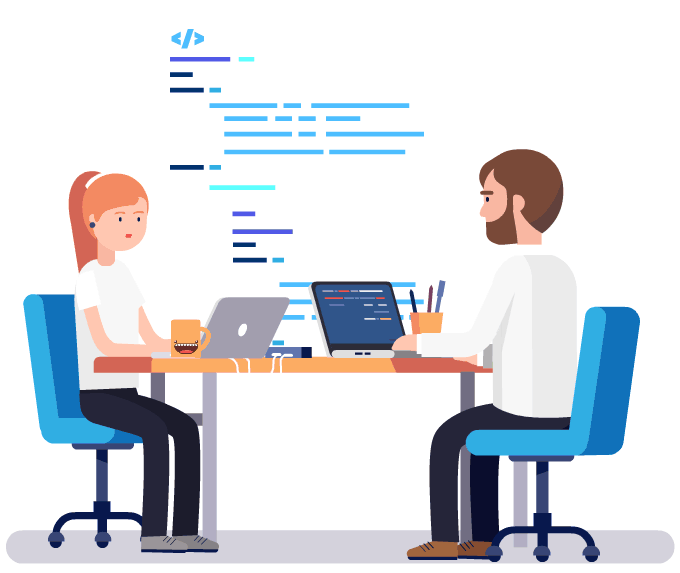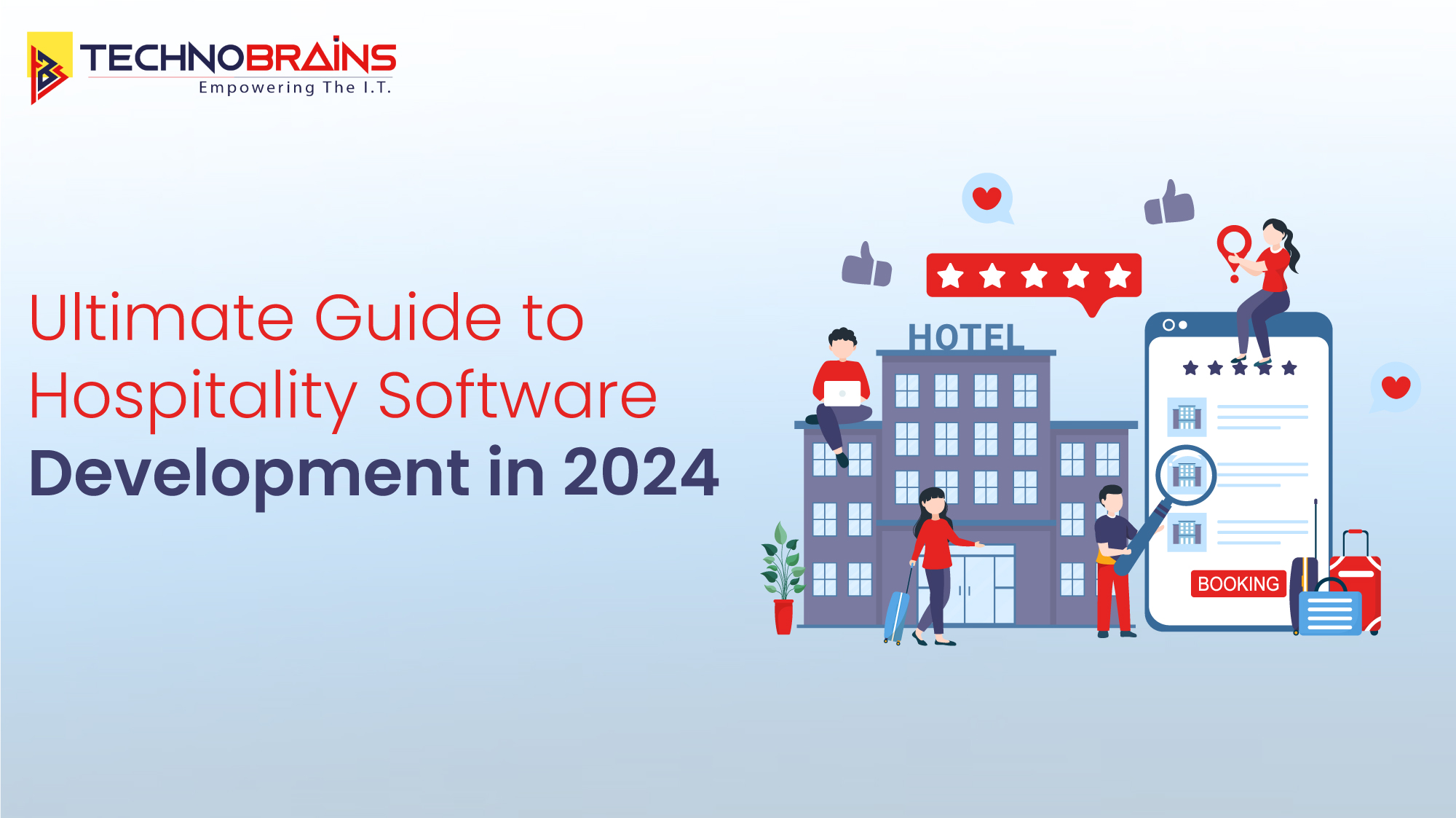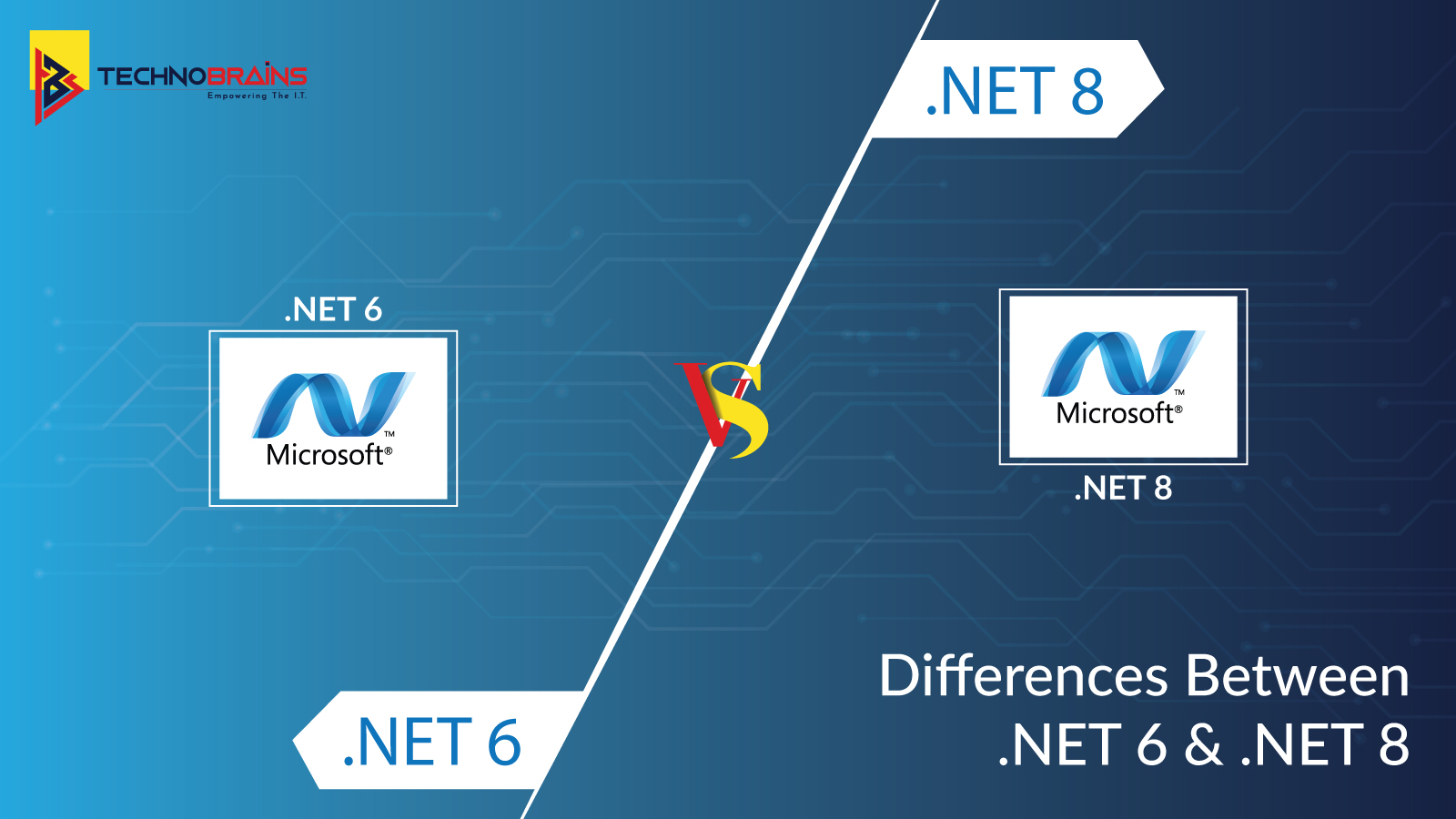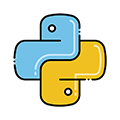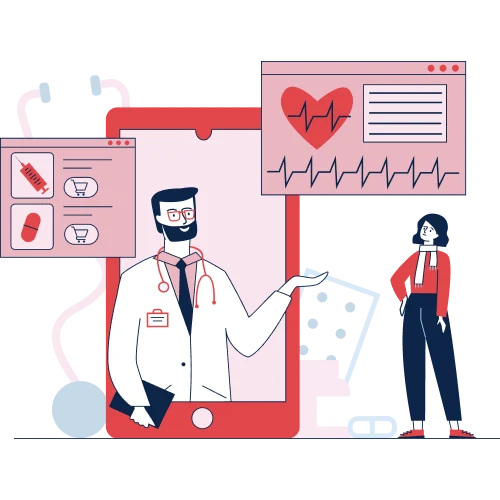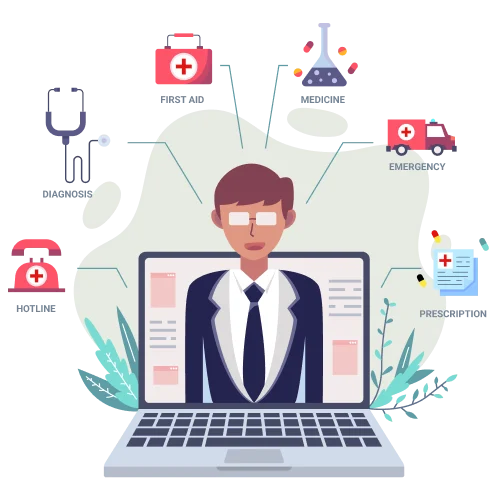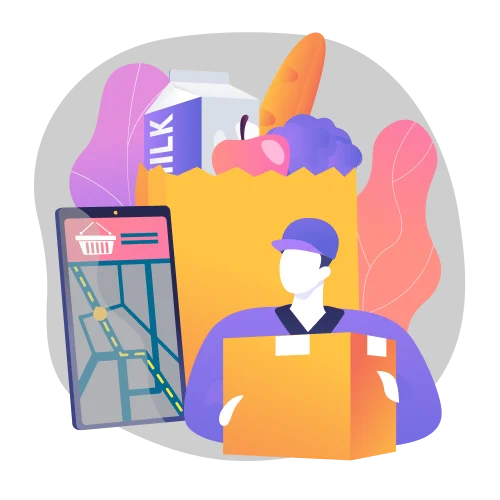Get 40 Hours Free Developer Trial
Test Our Developers for 40 Hours at No Cost - Start Your Free Trial →
Want to take your hospitality to the next level in 2024? In this guide, we will discuss the latest trends and technologies that would make a greater and more positive difference. But that’s not all. It also includes more advanced CRM tools and new-generation mobile applications aimed at personalization of guest experience for creating loyalty. In this blog, we have discussed a range of topics and information related to how you can achieve the best possible outcome for your hospitality business and reach new heights.
Understanding Hospitality Software Development
Hospitality software development involves creating customized digital solutions to meet the diverse business needs of the hospitality industry. From hotels and resorts to restaurants, event venues, and turnkey solutions, these are aimed at making operations smooth, enhancing customer experiences, and bringing overall efficiency into the workflow.
Why is Hospitality Management Software Important?
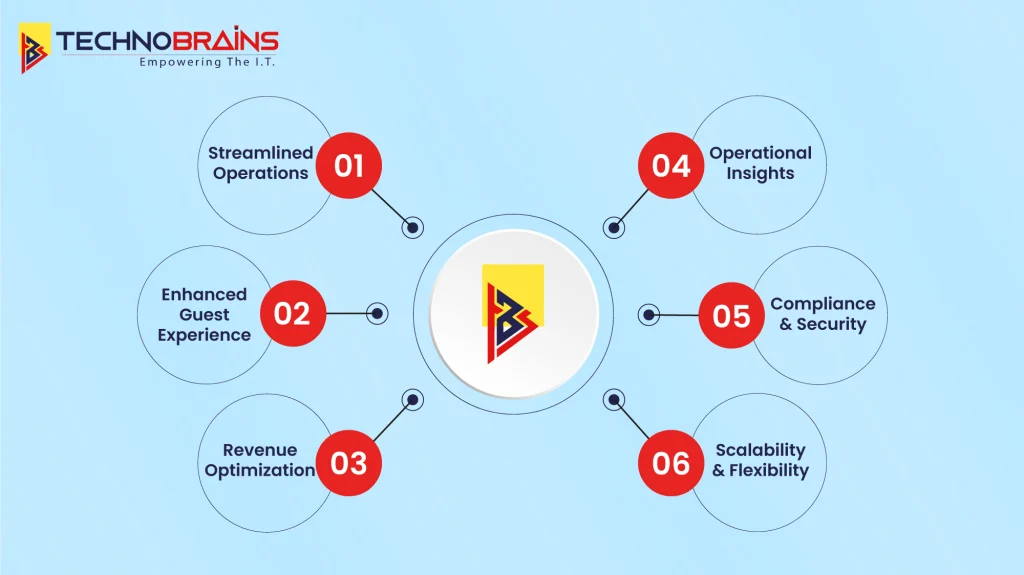
A hospitality management system or software is essential for modern hospitality businesses that intend to enhance operational efficiency, improve the guest experience, and ensure maximum profitability. Here are key reasons why investing in an HMS is crucial:
1. Streamlined Operations
An HMS is a program that automates and integrates essential operations: from reservations to check-ins, assigning rooms, and finally the billing of customers. All these are centralized by the system, eliminating paperwork, reducing manual errors, and increasing the pace for completion of tasks.
2. Enhanced Guest Experience
Personalization is the very essence of hospitality. Guest preference information, booking history, and more about special requests are stored within an HMS, allowing a hotel to offer tailored services to its guests.
3. Revenue Optimization
Revenue Management Systems in hospitality management systems use data analytics to estimate demand, study market trends, and change pricing strategies in real-time. HMS achieves revenue at maximum occupancy levels through rate optimization and offer activation.
4. Operational Insights
Comprehensive analytics provided by HMS enable users to create great insights into occupancy rates, revenue performance, guest demographic data, and operational inefficiencies. Such insightful information at hand thus drives informed decisions on resource allocation, marketing plans, and service enhancement—the drivers of continuous improvement and business growth.
5. Compliance and Security
HMS solutions ensure compliance with industry regulations and data security standards. They protect sensitive guest information, facilitate secure payment processing, and maintain audit trails for accountability.
6. Scalability and Flexibility
One of the significant hospitality enterprise growth keys is scalability. HMS solutions are modular and can be tailor-made to suit diversified business needs that scale operations seamlessly as growth happens.
Different Types Of Hospitality Software
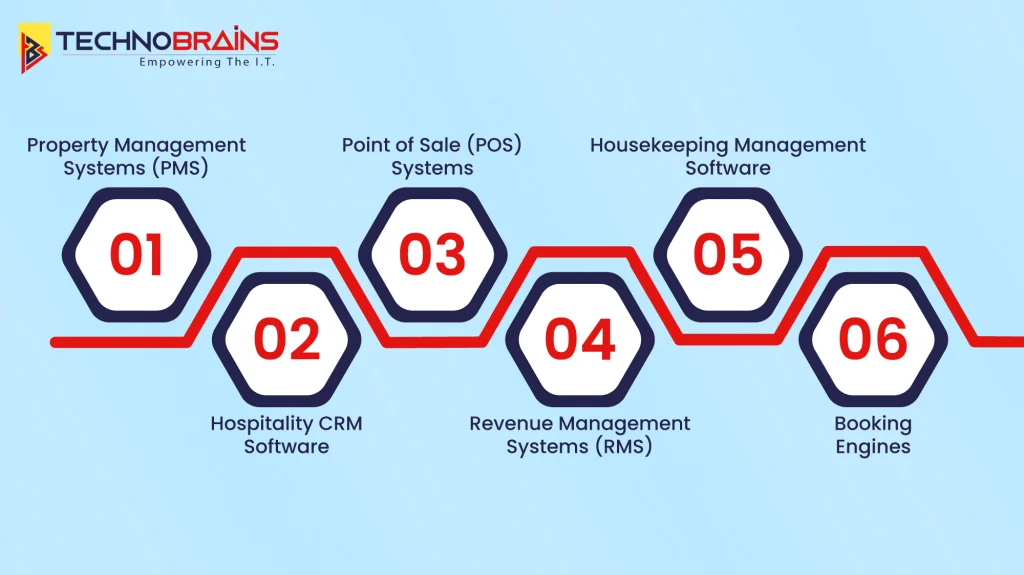
Hospitality software is a suite of various customized applications designed for facilitating operations as well as hallmarking customer experiences in multiple industries associated with hospitality. Here are the key types of hospitality software used today:
1. Property Management Systems (PMS):
A successful property management business relies on a property management system that handles daily operations in places such as hotels, lodges, and resorts. PMS software automates reservations and check-ins, room assignments, billing, and housekeeping schedules. It integrates with other systems to smoothly ensure the operations of POS and CRM, and it provides a centralized platform for people to handle guest interaction and administrative services in such an environment.
2. Hospitality CRM Software:
Hospitality CRM software is primarily based on the management of relations between guests, which is achieved through centralization of information about guests’ data and preferences. They maintain records of guest interactions and booking history so that they can personalize guest experiences. Therefore, campaigns for targeted marketing, loyalty rewards, and guest feedback management get implemented more quickly, enabling long-term relationships with the guests to drive satisfaction.
3. Point of Sale (POS) Systems:
The POS systems are integral to any restaurant, bars, and other beverage outlets that manage transactions. They automate order processing, inventory management, and payment transactions. The implementation of the POS interfaces with the PMS in synchronizing guests’ charges and payments to their master bill for correct billing and efficient service delivery.
4. Revenue Management Systems (RMS):
The RMS system automates a property’s price and revenue strategies based on real-time data analytics. Demand forecasting, market trend analysis, and price recommendations will also be usable to maximize dynamic revenues. The RMS solutions are integrated with the PMS and CRM so that price decisions will be consistent with demand forecasts and guest segmentation strategies.
5. Housekeeping Management Software:
Housekeeping management software automates and tracks housekeeping tasks ensuring that tasks set or scheduled are done accordingly. Tasks are assigned to personnel; progress is monitored as rooms are cleaned and maintained on time. It also ensures good communication between housekeeping and the management team and improves operational efficiency.
6. Booking Engines:
Booking engines make it simple to allow reservations through a hotel’s website or mobile app. These tools offer real-time availability, secure transactions in booking, and customized experiences in booking. The booking engines also integrate with the PMS for automated reservation confirmations, room allotment, and guest notifications to maximize booking efficiency and guest satisfaction.
Read Also, Different Types of Hospitality Software You Must Know About
Process of Hospitality Software Development
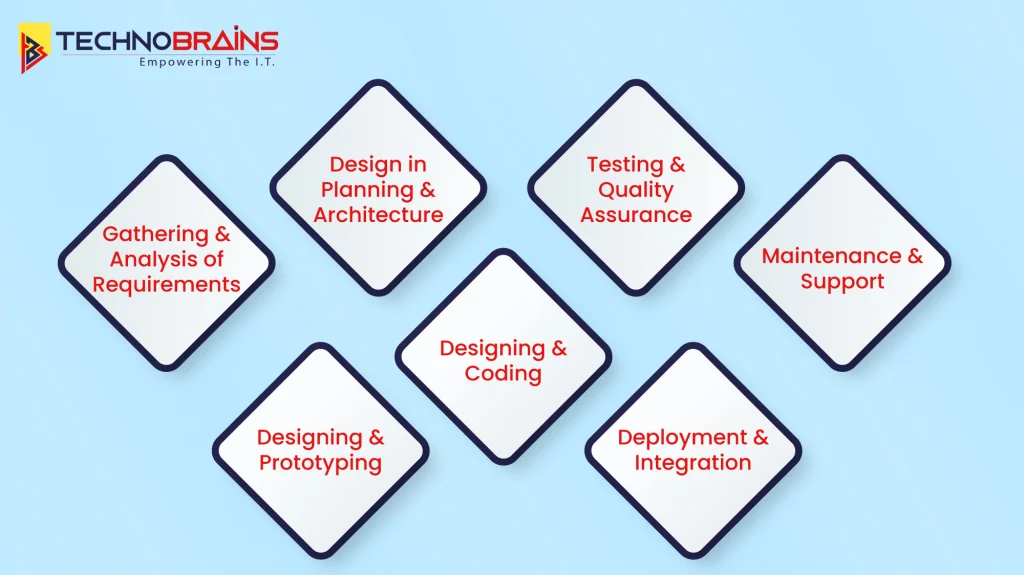
Hospitality software development is a definite procedure for making solutions tailored according to the divergent requirements of businesses under the hospitality umbrella. Mobile app architectureHere is the general overview of a standard process used for developing software:
1. Gathering and Analysis of Requirements:
This initial stage elicits requirements through detailed discussions with hotel managers, staff, and IT teams. Understanding their particular needs and challenges in the hospitality business helps define the scope, features, and functionalities required in the software solution.
2. Design in Planning and Architecture:
Together with architecture design, a complete project plan is developed once requirements are gathered. In this stage, the software’s technical framework is documented, including the database structure, modules, and level of integration with existing systems, including the PMS, CRM, and POS. Therefore, the architecture design should have certainty of scale, security, and compatibility with future upgrades.
3. Designing and Prototyping:
Prototyping refers to creating a semblance of what things will look like in the eventual interface and software functionality. This shall give the stakeholders a complete overview of the final product and make relevant comments from the very early stages of the development process. UI/UX design is necessary in this phase to ensure that both guests and staff move through with ease since accessibility and smooth user experience are a surety.
4. Designing and Coding:
The actual development phase includes coding the software by the approved design and prototype. Solution developers often use agile methodologies that allow iterative development with continuous feedback and corrections. They work on developing backend functionality, frontend interfaces, integrations with third-party systems, and data management features.
5. Testing and Quality Assurance:
Q.A. is carried out to maintain the conformance of software based on performance, usability, and security. Testing involves functional testing to verify that every feature works as expected, performance testing to answer questions about how responsive a system can be under load, and security testing to find flaws and deal with issues. QA guarantees the stability, reliability, and deployment readiness of the software.
6. Deployment and Integration:
This would involve installing the software on servers, configuring databases, and integrating with previously existing IT infrastructure. The other activities in this phase include data migration, setting up user accounts, and staff training in using the new software effectively. With post-deployment support, that transition remains smooth, resolving initial hiccups or through user feedback.
7. Maintenance and Support:
Following that would be continuous maintenance and support, which would also assist in resolving bugs, adding new features, and providing for the software to be as optimized and secure as possible. Regular updates and patching provide for functionality improvements, mitigation against growing security threats, and flexibility to adapt to changing business needs and trends.
Read Also, Hospitality Software Development Process
Difficulties in Developing Software for Hospitality Management
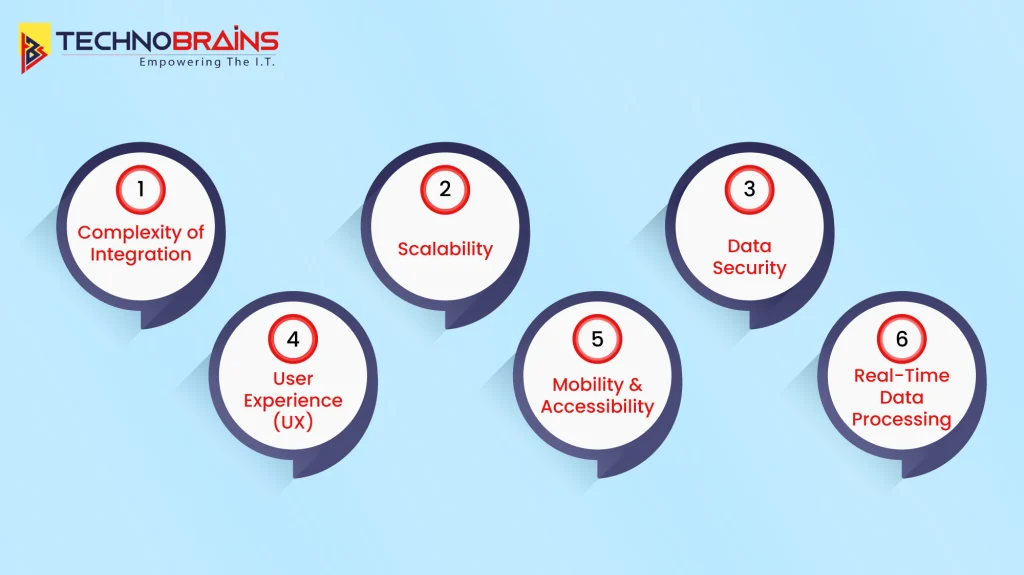
The problems with hospitality management software development are of an altogether different level. Here are a few of the critical challenges in hospitality management software development:
1. Complexity of Integration:
The hospitality management system, in most cases, has to be integrated with various other existing systems like a booking engine, payment gateways, and property management systems. Ensuring compatibility and smooth data flow across these platforms is of paramount importance but is usually quite tricky due to differing technologies and protocols used in these applications.
2. Scalability:
Hotels run the gamut from boutique to large chain operations, with huge disparities in size and operational needs—quite a challenge when developing software that scales effectively to accommodate various sizes and types of establishments while retaining performance and reliability.
3. Data Security:
Treating sensitive customer information—personal data and payment information—shall be done with due security measures. Such compliance with all these industry standards, including GDPR and PCI DSS, further complicates software development. More specifically, defending software means thorough data encryption, access controls, and regular audits for security.
4. User Experience (UX):
The software should provide user-friendly interfaces and workflows that maximize user experience for staff and guests. It needs in-depth knowledge of hospitality workflows and user behavior to create instinctive interfaces for the very different types of users involved—from front-desk operations to guest services.
5. Mobility and Accessibility:
Hospitality software will have to be available on varied platforms and devices in today’s digital age as the guest, much like the staff, begins to use mobile devices more and more. Designing responsive designs and mobile-friendly features for faultless functionality and performance across a range of screen sizes and operating systems is a challenge.
6. Real-Time Data Processing:
Hospitality operations need real-time data if efficient decision-making and service delivery to customers must be achieved. Real-time data processing capability with dependable connectivity is required for developing software that will process large volumes of data like rooms available, bookings, and guests’ tastes and preferences.
How Much Does it Cost to Build a Hospitality Management System?
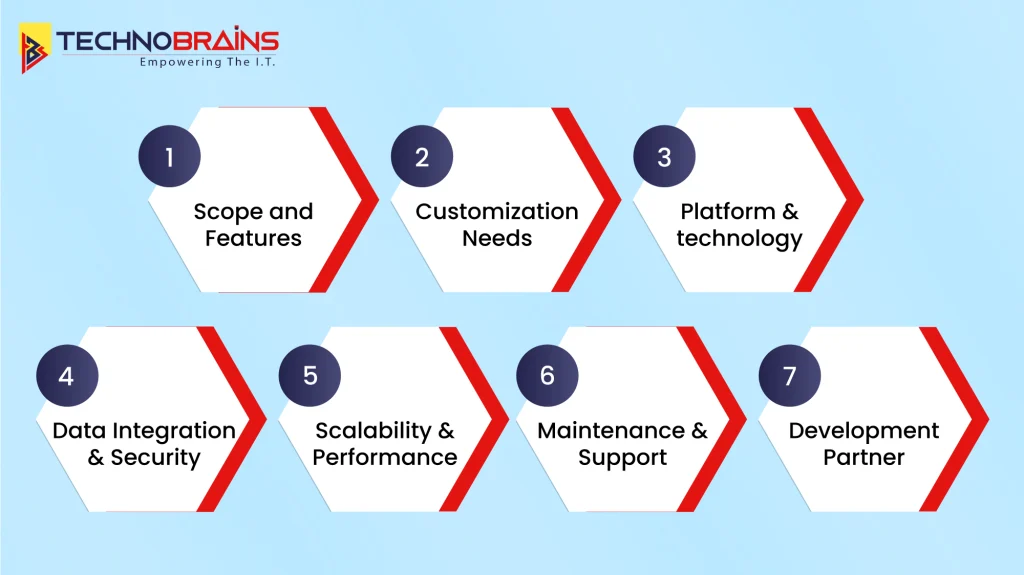
Different factors intervene in the development cost of a hospitality management system. Here’s a breakup of various such factors that impact the cost of developing a robust hospitality management system:
1. Scope and Features:
The hospitality management system’s cost greatly depends on the scope and features provided in the system. Those basic ones, with reservation handling, management of guests, and their billing, will be way much cheaper compared to more comprehensive solutions that include advanced analytics, CRM integration, and multi-property management capabilities. Each additional feature adds complexity and development time, influencing the overall cost.
2. Customization Needs:
The extent of the system’s customization to suit specific business requirements has an effect on the cost. Customization involves setting up the software to integrate into existing systems, accommodate special workflows, or add branding elements that require extra development efforts and cost more than buying one off the shelf.
3. Platform and Technology:
The choice of the technology stack and the platform on which the system has to be developed affect costs. The development of a mobile application, a web-based application, or both can have varying costs. Mobile application costs are different from a web-based application cost. Also, the use of specific technologies or web frameworks will involve the need to hire exceptional skill developers, hence changing the price of a project.
4. Data Integration and Security:
Planning and development effort is needed to integrate with external APIs, third-party services like payment gateways, or old legacy systems in the hospitality environment. The robust rollouts of data security measures, such as compliance with industry standards and data encryption to protect guest information, are equally crucial elements that add to the overall development cost.
5. Scalability and Performance:
Such a system, to grow with the business and accommodate increasing volumes of data efficiently, needs some up-front planning and related investment. If designed to scale, a system can add properties, users, and features without heroic reengineering efforts that might take away from resultant initial development costs.
6. Maintenance and Support:
This would also imply post-launch maintenance, updating, and technical support to keep the system going. These costs need to be factored in at the beginning to estimate the total cost of ownership over a system’s lifetime.
7. Development Partner:
The choice of a development partner, in-house or outsourced to a software development company, influences the cost; rates differ geographically based on the expertise and reputation of the development team.
Read Also, Cost of Hospitality Software Development in 2024
Conclusion
Hospitality software development will take a lead role in improving guest experiences and operational efficiency in the year 2024. In case you are looking for the most reliable software development service consider TechnoBrains at your service. Looking towards solutions moulded by the industry trend helps a hotel or resort stay ahead. Investing in innovative hospitality software is essential to meet developing consumer needs and expectations and support future growth.
Still, Stuck with Questions? Contact Us and get all your answers.
